 Though I write Christian fiction, the spiritual themes of my books are most important but oftentimes least discussed. I do a lot of guest posts and written interviews for publicity during the launch of a new release. The final question is usually, “What message do you hope readers come away with after reading this book?”
Though I write Christian fiction, the spiritual themes of my books are most important but oftentimes least discussed. I do a lot of guest posts and written interviews for publicity during the launch of a new release. The final question is usually, “What message do you hope readers come away with after reading this book?”
My answer for Potiphar’s Wife is found in the book itself. It’s on a page all by itself at the front of the book after the Dedication, after the Note to Reader, after the Character List, and Glossary. The single most important heart message I wanted readers to hear was this:
A slave doesn’t always wear chains, nor does a master possess all power.
What?! I mean, it’s got a nice ring to it, but what’s so spiritual about slaves and masters in biblical times?
I hope by reading a little farther, you’ll see that slaves and masters extends to more than social classes. In a very real sense, we can become slaves–or masters–in spirit, mind, or body. And if we are children of the Most High God, we have the choice as to Who becomes our Master.
Thanks For Your Questions!

Today is the final of four categories of questions on Potiphar’s Wife submitted by YOU, my faithful newsies, during release week. Click on any topic below to see the other articles you might have missed!
We had four “spiritual themed” questions that I think will bless your heart–as they did mine!
Truth vs. Fact
Question #1
- How did you decide on the name Zuleika?
As I’ve mentioned in a few other posts, I found Zuleika (alternate spellings: Zulaikha, Zulaixa, Zulaykha) named in “historical” documents like the Quran and Ginzberg’s, Legends of the Jews. Many in our world would consider the Quran a sacred text–truth, even–to be revered and obeyed as many Christians regard the Bible. Here’s how one biblical scholar defines his views on inerrancy:
“The inerrancy of the Bible means simply that the Bible tells the truth. Truth can and does include approximations, free quotations, language of appearances, and different accounts of the same event as long as those do not contradict.” (Charles C. Ryrie, What You Should Know About Inerrancy, p. 16).
Other sacred writings, though valuable and informative in their historical context, cannot be held to the standard of perfectly true as is the God-breathed Word of Scripture. The Bible is one story told through 66 books written by 40 authors over 2000 years. It’s the best-selling book of all time—and WE are a part of its story.
Question #2
- Is Potiphar’s wife’s seduction of Joseph portrayed as a reasonable action instead of a sin?
This was perhaps my favorite question of all. As I’ve mentioned in other posts, Potiphar’s Wife was the toughest book I’ve written to date because Zully was so hard to figure out and difficult to make “likable.” We were nearing the final draft, and I was weary. All I cared about was getting the book finished, out of my hands, and to the printer. But there was this niggling inside me–I knew I’d let Zully off the hook for her sin. I’d made her actions “reasonable” in an effort to make her likable for readers.
My line editor–who is also a dear friend and knows me well–asked if I was happy with our final product. I couldn’t lie. I said no and told her why. We both took VERY deep breaths and went back to the manuscript for more editing.
I’m soooooo glad we did! Now, I can answer this question with FULL confidence! Her seduction IS PORTRAYED AS SIN, not simply a reasonable action to make her palatable to today’s reader. Praise God for the convicting power of the Holy Spirit who knew I’d get this question! LOL! 🙂
No matter how reasonable or necessary a sin seems at a specific point in time, our God always makes a way out for those who remain faithful to Him. Joseph, for example, could have succumbed to Zully’s advances–just once! It might have kept him out of prison. However, the hard choice of obedience and suffering injustice was the very thing that brought overflowing blessing in the end.
Question #3
- Any favorite quotes from Scripture that helped you with your writing process?
I’m going to give y’all a personal glimpse into my Bible reading and journaling. During the difficult editing journey from May to early October, my daily quiet time was in Genesis 25-41. The stories of: Abraham’s death, Isaac and his twin sons–Esau and Jacob, and Jacob’s family were being imprinted on my heart as I was writing Joseph’s struggle with Potiphar’s wife.
I reached my breaking point on Friday, August 14th. After reading the account of Jacob wrestling with God on the banks of the Jabbok River (Gen. 32:22-32), I wrote this in my journal:
My email volley yesterday with [my editor] was hard but good, ending with her permission to set aside the manuscript for the weekend. I’m grateful, but I felt like Jacob, facing another failure… It seems even in my obedience, more and more hard things keep coming. But also–like with Jacob–You keep showing up to give me more revelation and encouragement for the next step in the journey. Maybe we’re ALL named Israel in this broken world, meant to struggle with men and our holy God because of our own sinful nature and the sin-sick world around us. As long as You keep appearing, Lord, I can keep traveling toward home.
There were other Scriptures that I used as arrow prayers for encouragement, strength, peace, etc. But it was ESSENTIAL that I had my morning alone-time with Jesus before I started the daunting task before me. It’s still essential–no matter what I have planned–because we never KNOW what the day holds!
Question #4
- I want to explore redemption and how Jesus can fix even the most lost and broken person!
I suppose this precious submission isn’t actually a question but more so a declaration of what she hoped to find within the pages of Potiphar’s Wife. It’s my prayer that every book I write has the Crimson Thread of Jesus Christ’s redemption within its pages.
I began writing in the late 90’s, but I wrote Bible studies and devotionals. Few people ever saw them and even fewer reached people who didn’t know Jesus. I was absolutely determined to teach with whatever I wrote. My passion is God’s Word and the eternal life we find within its pages. the Bible gives us the power to live abundantly now as well as the roadmap to eternal life with Him.
If I want to teach God’s Word, why do I write FICTION?
Because that’s how Jesus taught–with parables–and He was the greatest Teacher of all. My books aren’t merely entertainment, dear ones. They’re meant to be edu-tainment. It’s my hope that after you read Potiphar’s Wife, or any of my biblical fiction, you’ll be starving for the Bible’s Truth.
Today’s Questions:
- Which of today’s questions made you think more deeply about the spiritual themes of Christian fiction in general?
- Was anything in today’s post a new thought or something that caused you to go, “Hmmm”?



Comments 2
Well, I just finished POTIPHARS WIFE! I must say..you gave great grace to ZULLY!! Though… I have to admit you showed how GREAT GOD’s Grace is!!! I won’t give away the end…masterfully done! I must say! Another great gotta read book from this very special author!!! Thank you, Mesu for a great book…(though I am a little prejudiced… bec you are my daughter!!!!)
s
Author
I’m so glad you enjoyed it, Mama! I suppose if your mom doesn’t like your books, you’re in trouble! LOL! 😂❤️